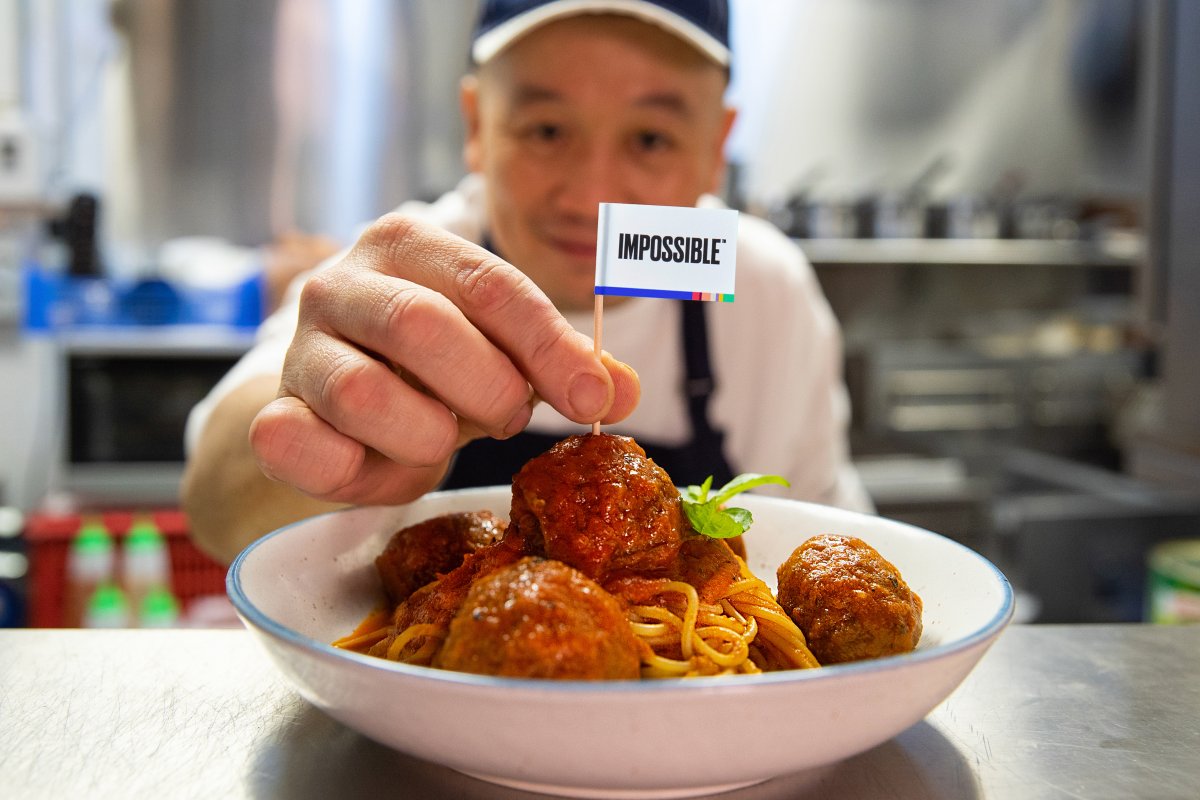Plant-based advocate

Credit: Shia Sai Pui/CUP media
Alumnus pushes company flagship product "to better than meat from cows"
July 9, 2019
Nick Halla works toward a more sustainable future—meat derived from plants. Halla (Chemical Engineering ’05) is a senior vice president of Impossible Foods, a California startup that engineers meat substitutes designed to be indistinguishable from real animal flesh.
“This isn’t a veggie burger,” said Halla, “This is meat made a better way.”
Halla’s quest to achieve the impossible followed an odyssey from Minnesota farm boy to chemical engineer to Silicon Valley entrepreneur.
Halla grew up on a family dairy farm in Owatonna (about 60 miles south of Minneapolis) and went to the University of Minnesota. He worked at General Mills for four years before heading to California to earn an MBA and master’s degree in environmental resources from Stanford University.
“My intention was never to do anything in food again,” he recalled with a chuckle. “I didn’t totally succeed.”
Halla met a Stanford medical school professor named Patrick Brown, an innovative researcher who helped invent DNA microarrays and co-founded the Public Library of Science, or PLoS. Brown shared his vision for another disruptive innovation: meat synthesized from plant-based products. The name of his startup captured the ambition of his vision—Impossible Foods.
Until then, Halla planned a career in renewable energy or clean technology because they seemed to offer the best avenues towards a greener future. As he talked to Brown, however, he realized he could make a larger impact by returning to the food industry.
After earning his MBA in 2011, Halla became the first employee of Impossible Foods.
As the company has grown, he has served as jack-of-all-trades in engineering, financing and accounting, real estate, supply chain, sales and marketing, business development, and corporate strategy.
“The things I learned at Minnesota in the chemical engineering program were not just the concepts of thermodynamics, fluid dynamics, or chemical reactions, which of course are useful,” he said.
“It was more the intuition on how to tackle problems,” Halla added.
Impossible Foods wants to tackle a very big one.
Humans have been butchering animals for at least 2.5 million years and keeping livestock for tens of thousands of years, but our old ways of doing business are no longer sustainable with the global population approaching 8 billion.
According to the United Nations Food and Agriculture Organization, the livestock industry produces about 14.5 percent of human-induced greenhouse gas emissions—more than vehicles, planes, ships, and trains. Grazing livestock occupies 26 percent of the ice-free land surface and feedcrop production consumes 33 percent of arable land.
Our meat craving drives deforestation—70 percent of clearcut land in the Amazon has become pasture and much of the rest is planted in feedcrops to nourish the animals.
How can humans satisfy our craving for meat in a sustainable way?
Going out of the box
Impossible Foods has spent five years researching what makes meat smell and taste so appealing and how to reproduce the chemical components from plant-based sources. It narrowed in on heme, an iron-containing molecule that helps transport oxygen throughout the body.
A version of this molecule called leghemoglobin occurs naturally in the roots of legumes. When mixed with plant-based proteins, fats, and other ingredients, it imparted a flavor and aroma like meat.
The company extracts DNA from soy plants, inserts it into genetically engineered yeast, and the fermentation process results in heme, which can be mass produced. Its signature product is the Impossible Burger.
Compared to beef, it has a smaller environmental hoof print— 87 percent less water, 89 percent less greenhouses gases, 96 percent less land, and 100 percent fewer cows.
“Our target from day one is the hardest-core, meat-loving consumer,” Halla said.
“We break down what gives meat all its fundamental properties—the texture, the transformation, the flavor, and aroma,” Halla said. “Now when we do blind taste tests with meat eaters, we’re head-on-head on preference with meat from a cow.”
More than 7,000 restaurants serve the Impossible Burger and the company plans to launch in grocery stores this year. In his latest role, Halla is leading both Impossible Foods’ retail and international businesses.
“The only way we’re going to change the system is by doing something completely out of the box,” he said. “You’re not going to change the system by making a slightly better veggie burger. We have to be better than meat from cows and in many attributes we already are.”
Story by Kermit Pattison
Read about more College of Science and Engineering alumni pushing the boundaries in their field:
Charlie Spanjers, Kyle Olson, Brad Guertin: Bike nerds
